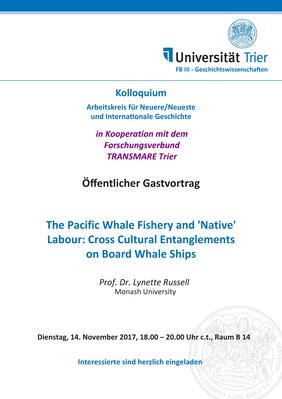Kolloquium Arbeitskreis für Neuere/Neueste und Internationale Geschichte
In Kooperation mit dem Forschungsverbund TRANSMARE Trier
Wintersemester 2017/18
Öffentlicher Gastvortrag
The Pacific Whale Fishery and ,Native‘ Labour:
Cross Cultural Entanglements on Board Whale Ships
Prof. Dr. Lynette Russell, Monash University
Dienstag, 14. November 2017, 18.00 – 20.00 Uhr c.t., Raum B 14
Interessierte sind herzlich eingeladen.
<link file:237451>Flyer
Amongst the possessions of Hobart based whaling captain Charles Bayley was a small photo album which held family portraits, and included a carte d e vis ite of the Tasmanian Aboriginal man William Lanné. Along with other Aboriginal men, Lanné had been part of Captain Bayley’s crew on -board the whal e ships Runnymede and Fortitude . In 1869 when Lanné died, the newspaper reported that among the many mourners were whal ing captains and mariners, and “ nearly all the masters of vessels in port” . Two whaling captains acted as pallbearers, along with two Aboriginal men, a native Hawaiian and a “coloured” American. The closeness of working together in the confined spaces of a whale ship built unexpected friendships and alliances. Chequerboard crews were a feature of the Pacific whaling fleet, and Aboriginal men were likely to find themselves working alongside Pacific Islanders, M ā ori, American, European and Lascar sailors as well as Native Americans an d former Afro - American slaves. Whaling was an industry where skill and e xpertise ensured a seaman’s economic and even physical survival. Although by no means was whaling an utopian or idyllic existence devoid of race -related problems, the industry nonetheless required men of all races and nationalities getting along together; safety and profit depended on it. In this paper, I will explore the cross -cultural relationships that emerged in these crews and contemplate how the whaling industry can contribute to our understanding of nineteenth century economic and colonial histories.

